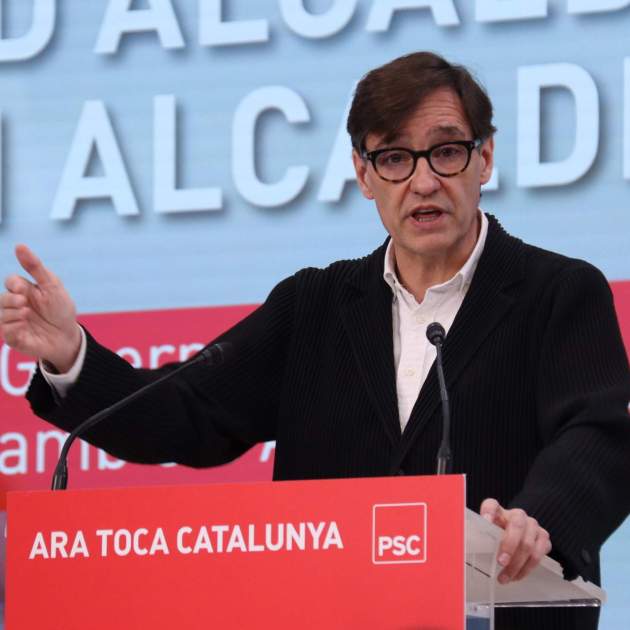A new attempt by the Catalan Socialists to reduce the Puigdemont effect. The first secretary of the Catalan Socialist Party (PSC), Salvador Illa, has asserted in an interview with the British newspaper The Times that if the Catalan Socialists win the government of Catalonia after the election on 12th May, this will show that "the policy towards (Carles) Puigdemont is the right one". Illa has been visiting the United Kingdom for a few days, meeting with various figures. As part of this trip, he gave an interview to the Rupert Murdoch-owned London paper, in which the Socialist candidate for the presidency of Catalonia maintains that "Spaniards are more afraid" of the leader of Vox, Santiago Abascal, than of Puigdemont, Catalan president-in-exile and Illa's electoral rival as candidate of pro-independence Together for Catalonia (Junts).
"This is not just for ideological reasons, but because people have experience of Vox sharing power in Spain's autonomous governments," says Illa, who argues that fear of the far-right party is the reason why "support for the Spanish Socialists has not collapsed". "May 12th will be a very important result. If we are able to lead the government of Catalonia, that will justify that our policy towards Puigdemont is the right one. I am sure that this will happen", added the PSC candidate, thus justifying the amnesty law as a "generous" measure to overcome Catalonia's "paralysis". He argues that the amnesty, which will wipe out all prosecutions for Catalan independence-related offences, is a "necessary step", using a simile to assert that it is like "a doctor who tells a patient that he must undergo surgery to regain his health".
The Socialists want to curb the Puigdemont effect
Since Puigdemont's announcement that he will head a Junts candidacy in the Catalan election, the Socialists have been trying to combat the so-called "Puigdemont effect", which some believe may be generated in the face of the physical return to Catalonia of the person who led the government of the Generalitat when it held the independence referendum of October 1st, 2017. Pedro Sánchez has already downplayed the Junts founder's candidacy, recalling that Puigdemont has twice headed the ticket since he went into exile in Belgium. The president-in-exile assured, when announcing his candidacy, that he is ready to return to Catalonia if the polls give him enough parliamentary strength to form a majority in Parliament to make him president of the Generalitat. Puigdemont also maintains that he wants to return to "finish the job" which was started in 2017 with the independence referendum. In fact, over the last few days, the independence movement has already asserted that this issue is already on the table. The other major pro-independence party, ERC, has also defended a referendum this week. However, it is a plan that the Socialists do not recognize. Salvador Illa himself has been forced to affirm forcefully that "there will be no self-determination referendum".
The context for Illa's comparison of the far-right and the independentists
In May 2023, the Socialists were soundly beaten by the right and far-right in municipal and autonomous community elections in Spain. But in the weeks afterwards, the spectre of far-right Vox dragging these new administrations, formed with hard right support, to dismantle progressive social policies and attack Catalan language rights, among other changes, was a key factor in a backlash from voters in the early general election held on July 23rd, when the predicted victory for the People's Party and Vox fell short. This then raised the possibility of a new coalition government led by the Socialists, which arithmetically required the support of many parties in Congress to succeed, and in particular, Junts, which had not been part of Pedro Sánchez's previous parliamentary majority. The Socialists then began a negotiation with Carles Puigdemont's party, which led to agreements including that of the amnesty law, improved status for the Catalan, Basque and Galician languages, and mediated talks on the political conflict between Spain and Catalonia, in return for Junts's support for the formation of the new Sánchez government. Thus, despite the controversy raised, in particular, by an amnesty law which was not in their electoral programme, the Socialists refer to the result of the July 23rd election to argue that, for Spaniards, the far-right is the greater threat.
